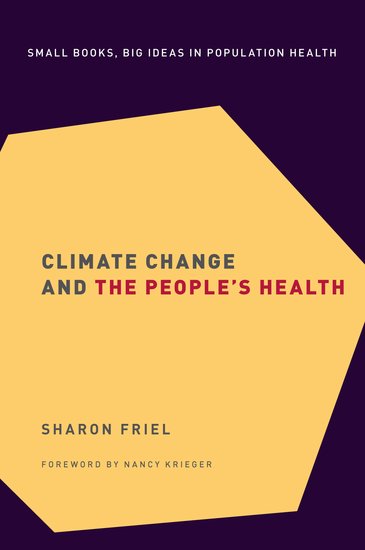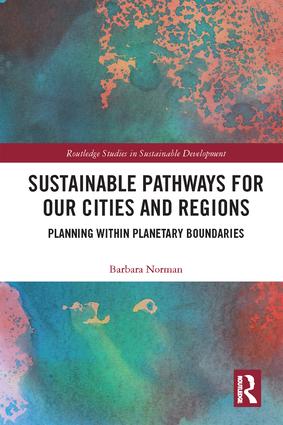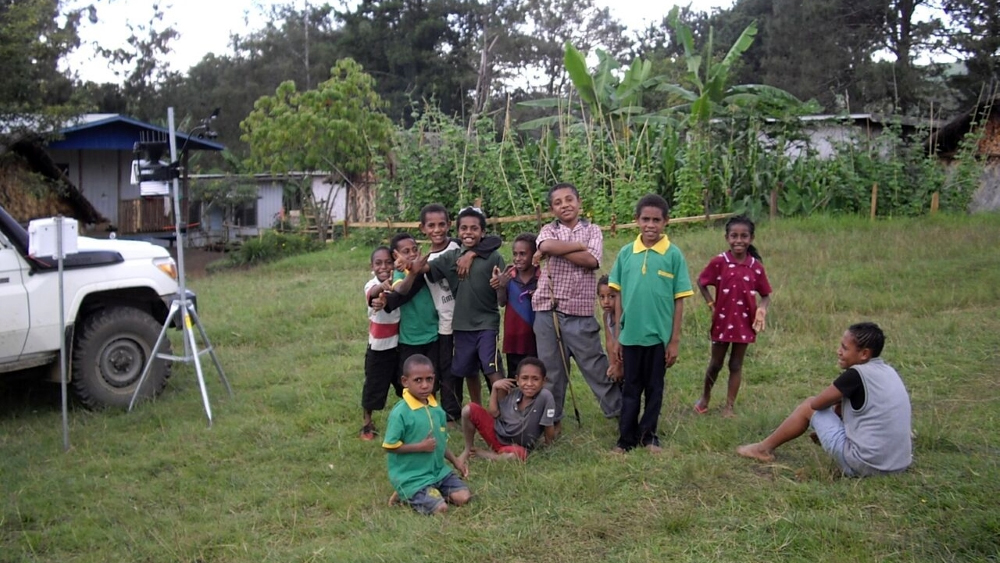2018 climate research highlights
Below is a small sample which demonstrates the breadth of research by our members in 2018.
Research stories 2018
- Designing a house that absorbs carbon dioxide
- Helping reduce hunger in rural Papua New Guinea
- How can we make our cities more climate friendly?
- Breeding climate resilient plants
- Who will take the lead on global climate action?
- Designing the streetscapes of the future
Transdisciplinary research across ANU
In 2018, the CCI was involved in bringing ANU staff together in three Grand Challenge projects, including a finalist and a semi-finalist, involving schools in every ANU College in the project proposals.
The CCI has also coordinated project proposals and activities relating to the negative emissions, adaptation, governance agendas including preparing a draft Australian Research Council Centre of Excellence (CoE) proposal on climate adaptation.
New books in 2018

Climate Change and the People’s Health
By Professor Sharon Friel

Sustainable Pathways for our Cities and Regions
By Professor Barbara Norman
Climate science
Emeritus Professor Patrick De Deckker from the Research School of Earth Sciences continues his research on Australian past climates aiming at understanding how the Australian landscape and oceans operated during significant (past) periods of climate change.
Dr Andrew Glikson published a paper reviewing the carbon cycle and mass extinction of the species and another on the methane time bomb.
Emeritus Prof Will Steffen and Dr Stephen Lade published research on self-reinforcing feedback loops that could cause continuing warming on a hothouse earth pathway.
Climate change and vegetation
Research at the ANU Borevitz Lab aims to address three overlapping objectives: improve agricultural yields, restore degraded landscapes and draw down carbon from the atmosphere to reverse global warming. This year Dr Megan Supple and others from the Borevitz lab, CSIRO, and parks WA, published an important research paper investigating the genetic diversity of a foundation eucalypt species to see how it might adapt to the changing climate.
Health and climate change
Dr Kathryn Bowen co-authored a paper discussing the links between climate change, migration and health.
As mentioned above, Prof Sharon Friel has published a new book, Climate Change the People’s Health, a bold new treatise on the relationship between climate change and social inequity, in particular climate change's role in health inequities. This is the first book to address these two topics in dual terms.
Climate change in Asia Pacific
Hannah Barrowman and Mahendra Kumar published research evaluation the role of development aid agencies in Timor-Leste in climate change adaptation.
Dr Bec Colvin co-authored a paper on the effects of climate change and environmental degradation on the floating villages of Cambodia’s Tonle Sap.
Agriculture and climate change
Various Climate Change Institute researchers are working on a NSW Office and Environment Heritage funded project to improve the co-design of climate adaptation strategies in NSW.
Prof Mark Howden had a number of papers published in 2018 on the impact of climate change on agriculture including Linking climate forecasts to rural livelihoods, Research priorities and best practices for managing climate risk and climate change adaptation in Australian agriculture, A review of empirical cases of transformational adaptation in agriculture under climate change, Ten essentials for action-oriented and second order energy transitions, transformations and climate change research.
Dr Steven Crimp has been working on a DFAT funded project on improving localised climate information services in Papua New Guinea. Read more here.
Dr Crimp published a number of papers including Consumer Response to Climate Adaptation Strategies in the Food Sector. This publication examined consumer willingness to pay for climate adapted food products. Another paper, co-authored with Prof Mark Howden, examined the changing nature of minimum temperature extremes and the synoptic drivers associated with this changing variability.
Dr Crimp’s research on possible future changes in South East Australian frost frequency examines different approaches to how we could improve of future projections of minimum temperature extremes by testing a number of different statistical approaches. Another paper examines how spatial modelling of extreme minimum temperatures can be incorporated into farm-scale management activities to reduce production risk.

Fenner School PhD student Federico Davila published a paper using a systems framework to look at how policy makers and researchers from four South East Asian countries perceive the role of smallholder farmers in food and nutrition security research.
Cities and climate change
Professor Xuemei Bai has had a productive year, including winning the 2018 Volvo Environment Award. Her research includes an article in Nature identifying key research priorities in cities and climate change, in the run up to the first ever IPCC Cities and Climate Change Science Conference held in March, 2018, Edmonton, Canada. Read How can we make our cities more climate friendly?
Another paper with PhD student, Yuan Peng, examined the various policy and experiments in low carbon transition in Shanghai and identified a nested structure of innovation that can facilitate low carbon experiments, capture the learning, and enable upscaling. A paper in Nature Climate Change outlined how well intended climate actions often compound each other and identifies key trade-offs and synergies between different climate actions at city level.
Prof Barbara Norman published an article on how smart city solutions and strong global urban networks are developing to manage massive urban growth.
Policy and economics of climate change
Recognition of the impact of ANU work overall
ANU has been ranked amongst the five most productive research institutions globally on market mechanisms for carbon emission reductions between 1992-2016. This is a good example of leadership by ANU in climate economics and policy research.
The university was ranked second to Resources for the Future and ahead of Oxford and Harvard Universities and Massachusetts Institute of Technology, based on an assessment of relevant publications and citations in the research literature.
Market mechanisms, such as emissions trading schemes and carbon taxes, are increasingly being used in the battle to fight climate change around the world.
“This ranking recognises the breadth and depth of expertise in climate economics and policy at ANU, with numerous ANU researchers collaborating and a strong history of work in this field.”
The high rates of citations of many ANU papers show that the research has been globally influential within the research community.
Read ANU ranked a global research leader on mechanisms for reducing greenhouse gas emissions.
Individual contributions
Professor Tom Kompas’s work has focused on the nexus between climate change and global trade. One paper calculates global economic images from climate change at different temperature levels for each of 139 countries in a large-dimensional trade model, across 57 commodity groups. It also shows the considerable global economic gains from complying with the Paris Climate Accord. Another paper provides an innovative approach for solving (otherwise unsolvable) large-scale global trade models. The framework allows us to determine the impact of climate change on long-run economic growth for 112 countries as a result of the effect of sea-level rise on land endowments and variations in crop yields and human health.
The G-Cubed model team from ANU, including Prof Warwick McKibben and Dr Larry (Weifeng) Liu, participated in the Stanford Energy Modelling Forum global model comparison project (EMF232) on US Carbon Tax Scenarios. Model results are included in the special issue of Climate Change Economics. The group has also published a paper on Border Tax Adjustments and Prof McKibben and Augustus Panton have published several new working papers focussing on the link between climate change and monetary policy.
They are also working closely with the Australian Treasury who use the G-Cubed model in house for policy and scenario analysis. They are preparing a global model-based analysis of the Paris Climate Accord which should be published by the Brookings Institution and ANU in December 2018.
Professor Frank Jotzo has published a number of papers on climate policy including on China’s emissions trading scheme, US and international climate policy under Trump, Economic growth and development with low carbon energy and Coal taxes as supply side climate policy.
Professor David Stern and Dr Zsuzsanna Csereklyei have used multicointegration modelling, which is an econometric time series approach to model the relationship between radiative forcing, surface temperature and heat storage in the ocean. Taking into account the storage of heat produces much more realistic results than previous efforts using econometric methods. In particular the climate sensitivity is 2.8 degrees C, which is close to the consensus and it takes hundreds of years for temperature to fully adjust to changes in radiative forcing.
Professor Karel Janda co-ordinates an EU supported project, Global Excellence in Modelling Climate and Energy. ANU is the only Australian partner in this project involving world leading universities like Oxford, LSE, MIT, Harvard, UC Berkeley, Stanford, Princeton, .
Dr Paul Burke published a paper measuring the contribution of carbon pricing to adoption of key zero-carbon energy technologies.
Prof David Stern and Dr Paul Burke also published a paper discussing a new modelling approach for understanding the long-run relationship between economic development and greenhouse gas emissions.
In an article published in in November, Dr Jack Pezzey argues that the damage from climate change likely a century or so from now is so unprecedented that it can never be valued monetarily, so that carbon prices based on the "social cost of carbon" will always be deeply disputed. Instead, he recommends that carbon prices to guide climate policy should be based on low-cost pathways to socially agreed, physical climate targets.
Dr Grace Chiu developed an extension to the statistical approach called latent space network modelling and this year received a cross-college grant to study Australian policymakers influences on each other at the national level.
Dr Bec Colvin published research on Building a value proposition for spanning the boundary between science and policy.
International climate negotiations
Dr Ian Fry co-authored a research paper on Piecing the Paris Puzzle: Links and Gaps in the Paris Agreement on Climate Change as part of the European Capacity Building Initiative.
Community attitudes to climate mitigation
Dr Bec Colvin published a case study of the complications of using a community vote to make decisions about wind energy, prepared with a teaching package.







